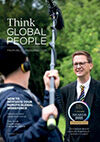Is global work losing its attractiveness?
Global Mobility is in crisis as companies use more virtual work. Convincing staff to accept an assignment abroad has never been harder. Is there a solution?

Mid-career, family and disruption
Organizations make use of global work for leadership development, subsidiary control, knowledge transfer or when there is a shortage of skills in the host country. Often global talent is in their mid-careers when they leave for organizational assignments, precisely when they are more likely to have higher workfamily conflict and financial debt. As we grow older, we are also less willing to compromise, especially with regards to children and family. The GLOMO research has shown that Covid-19 fueled familyoriented decisions, as personal and professional spheres were merged in the domestic space, challenging a long-pursued but fragile balance.Read more GLOMO research:
- Location Threats during and after COVID – Identifying and Managing Challenges in Hostile Environments
- Global Mobility Refined
- Do expatriates want this new normal? Covid, flexible work and embeddedness
- Creating Happy Endings – Building on your Foreign Work Experiences
Assignments are disruptive, requiring people to leave their comfort zones and adjust to new cultures. In exchange, companies will try to minimize the shock by providing financial compensation in the form of enablers (visa, relocation services, schooling costs), equalizers (housing and cost of living allowance, taxes) and financial incentives (foreign service premium). Monetary rewards can be useful to attract candidates, but research shows it won’t have the same impact in securing their permanence abroad as socialties, career prospects and perceived support prevails.
Expatriate career risks
When you move abroad, you lose sight of the political, relational, and institutional changes that are happening back home. Depending on the nature of your contract, it’s a gamble. It can help you climb the career ladder or not, as your foreign achievements may not be considered when you come back. There is no guarantee.In turn, the pandemic has raised the question whether the costs of global assignments are justified. With the development of technological skills, especially those associated with virtual teams and spaces, is expatriate work still necessary? Hiring locally is much more compliant and cost effective. Could expertise be taught through virtual means, anticipating skill shortages in key countries? Could we foster cross cultural abilities through domestic-based experiences if the place is diverse enough?Enterprises have a tough choice to make. They can either embrace the going local mindset, seizing the sudden technological upskill to virtually train domestic employees to achieve business objectives from a distance, lowering the need for staff mobility. Or they can try to better understand the profi le and expectations of people being sent abroad, allowing a bigger variety of compensations mechanisms, and strengthening the bond between reward and talent management.
Research findings and the future
The GLOMO research has shown that a compromise can be found in the middle. Depending on organization business models, the acquisition of international knowledge can foster important networks, diffi cult to be replicated digitally. Diff erent motivations and personal interest should be assessed meticulously, as they can allow different contractual agreements to be proposed, cutting costs in a winwin scenario. Assignments need to be fully aligned with business needs. Expatriates are often resilient in dealing with distracting emotions while keeping the will to learn, grow and demonstrate competence. This unique skill set should be supported by the right leadership.For global work to become attractive again, it will be necessary to focus on enabling all stakeholders to deal successfully with uncertainty. Achievements abroad should be transferred and recognized at the repatriation stage or before the next departure, fostering psychological support for the development of a global mindset and career. Context matters when we deal with mobile work. In a world that changed drastically in a matter of months, policy flexibility is key.About the authors:

If you have a people-centred approach to driving success across your organisation and understand the importance of wellbeing for talent to flourish, then why not enter the Think Global People and Relocate Awards. There are ten categories to choose from. Join us on 9 June for the results and the Future of Work Festival.
Read more about reseach in Global Mobility and International Assignments. We want to hear your views - email editorial@relocatemagazine.com.
Subscribe to Relocate Extra, our monthly newsletter, to get all the latest international assignments and global mobility news.Relocate’s new Global Mobility Toolkit provides free information, practical advice and support for HR, global mobility managers and global teams operating overseas. Access hundreds of global services and suppliers in our Online Directory
Access hundreds of global services and suppliers in our Online Directory©2025 Re:locate magazine, published by Profile Locations, Spray Hill, Hastings Road, Lamberhurst, Kent TN3 8JB. All rights reserved. This publication (or any part thereof) may not be reproduced in any form without the prior written permission of Profile Locations. Profile Locations accepts no liability for the accuracy of the contents or any opinions expressed herein.








































